Her has a message for ending China-US mistrust
Updated: 2014-01-15 06:17
By Michael Barris (China Daily USA)
|
||||||||
Does Spike Jonze's new movie, Her, a tale of a man who falls head over heels for his computer operating system, pander to US mistrust of China? Or does it merely use Shanghai as a stand-in for the Los Angeles of the near future to make an important point about how people interact in a high-tech society?
 That is the question. Writer/director Jonze's acclaimed film, which won a Golden Globe award Sunday for best screenplay, finds Joaquin Phoenix's character, the melancholy Theodore Twombly, irresistibly drawn to "Samantha" (Scarlett Johansson), the husky voice of his new, artificially intelligent operating system, which not only tidies up his inbox and organizes his hard drive, but also provides welcome companionship for Theodore, who is in the midst of a painful divorce and facing the prospect of taking on the dreaded dating jungle.
That is the question. Writer/director Jonze's acclaimed film, which won a Golden Globe award Sunday for best screenplay, finds Joaquin Phoenix's character, the melancholy Theodore Twombly, irresistibly drawn to "Samantha" (Scarlett Johansson), the husky voice of his new, artificially intelligent operating system, which not only tidies up his inbox and organizes his hard drive, but also provides welcome companionship for Theodore, who is in the midst of a painful divorce and facing the prospect of taking on the dreaded dating jungle.
The Los Angeles in which Theodore works and lives merges locations in the real City of Angels and in the Pudong business district of Shanghai. Shots of the Chinese city's raised walkways and skyscrapers (in the future, LA's earthquake problems apparently have been solved) create a vision of downtown Los Angeles that is, in one US reviewer's words, "filled with curves and fabrics, beautiful lighting and soft textures". Production designer K.K. Barrett said the aim was to make the city look "convenient, comfortable, healthy, and available" — a veritable reversal of the dark persona that characterized LA in the 1982 dystopia movie, Blade Runner — to serve as a perfect foil for Theodore's daily struggles.
The city's look "shows things that can't be heard through dialogue," Barrett said in an interview with Curbed Los Angeles. "It gives more information about the characters and the world around them without being intrusive. The production design is wrapped around him and becomes part of his character — and the bubble he lives in."
Particularly striking are several shots of Chinese neon signs among the towers. "We didn't hide it," Barrett said of the signs. "It's part of what LA is and what LA will become. We embrace the signage."
With his not-so-subliminal "the Chinese are coming" message, Jonze could be accused of trying to play to anxiety in the US over China's emergence as an economic powerhouse. A survey released in mid-December by the Carnegie Endowment for International Peace and the China Strategic Culture Promotion Association found that just 26 percent of the US public believes China can be trusted a "great deal" or a "fair amount". Just 13 percent of the Chinese public said the same thing about the US, according to the data.
Reflecting that mistrust, Jason Farago, writing in the liberal New Republic, called Jonze's use of Chinese locations and signage "shorthand for the future". Expressing the worst held fears about China, Farago wrote: "A society such as the one in Her, in which even our emotions have been co-opted by corporate entities, is highly unlikely to be a democracy—and given both America's ongoing economic and political meltdown and our unexpectedly slow progress in the development of artificial intelligence, the real story of Her can only be that one. … And our own future, if we aren't careful, could very well end up even scarier than the already grim one Her depicts: one in which we have lost our freedom without even the compensation of Scarlett Johansson whispering in our ears."
No doubt there will be more of this negative talk – particularly as Her continues to garner accolades. Reflecting broad enthusiasm for the film, the Rotten Tomatoes website reported as of 4 p.m. Tuesday that the movie had won the favor of 93 percent of critics, who rated it 8.6 out of 10, and 87 percent of the audience, who scored it 4.2 out of 5. Three critics with the US entertainment trade journal, Variety, have picked Her as a contender for a Best Picture Oscar (Academy Award nominations will be announced Thursday).
Rather than trying to exploit nascent Sinophobia, Jonze's deft use of Shanghai locales ends up achieving a worthwhile purpose — one of the virtues of good art – it makes the audience think; as in thinking about the hazards of letting technology dominate our lives — rather than about China's increasing influence over the US.
Certainly, taking this film as incentive to develop the ability to conduct more meaningful interpersonal relationships is the first step in ending mistrust — not only between the US and China — but around the world.
Contact the writer at michaelbarris@chinadailyusa.com
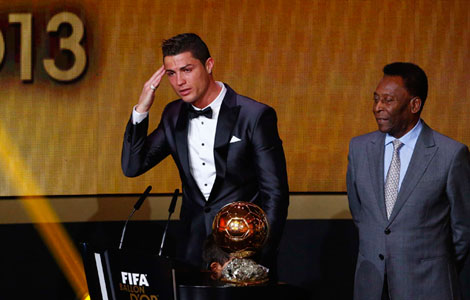
 Cristiano Ronaldo wins FIFA best player award
Cristiano Ronaldo wins FIFA best player award
 Xuelong carries on mission after breaking from floes
Xuelong carries on mission after breaking from floes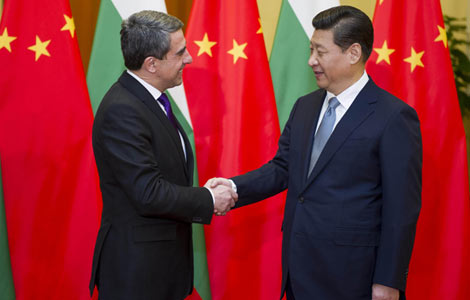
 Beijing and Sofia vow new initiatives
Beijing and Sofia vow new initiatives
 71st Golden Globe Awards
71st Golden Globe Awards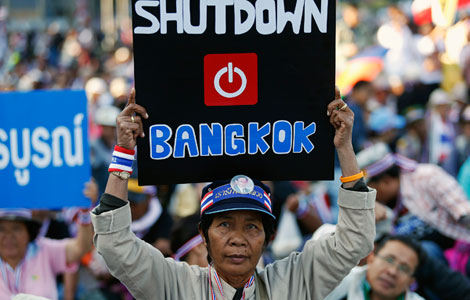
 Bangkok unrest hurts major projects and tourism industry
Bangkok unrest hurts major projects and tourism industry
 No pant for cold subway ride
No pant for cold subway ride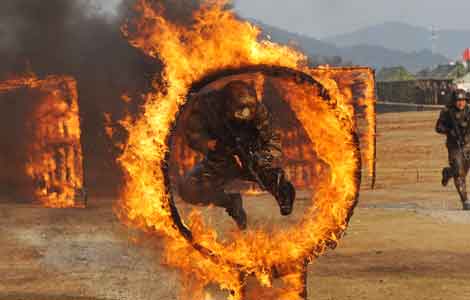
 Tough army training turns boys into men
Tough army training turns boys into men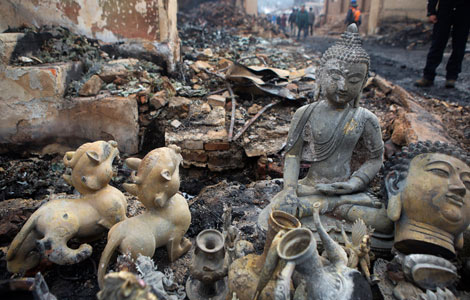
 Blaze prompts concern for ancient buildings
Blaze prompts concern for ancient buildings
Most Viewed
Editor's Picks
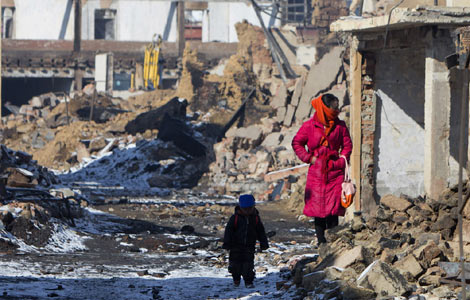
|

|

|

|

|

|
Today's Top News
At least 16 dead in E China factory fire
Xi calls for reform to fight graft
S. China Sea rules no threat to peace
Park urges Japan to face history
Newspapers must change or die
Abe’s brother to explain shrine visit to US
Protests cannot end Thai deadlock: observers
Mercy killing still a hot button issue
US Weekly

|

|







